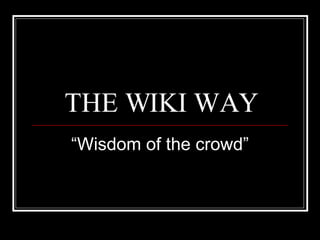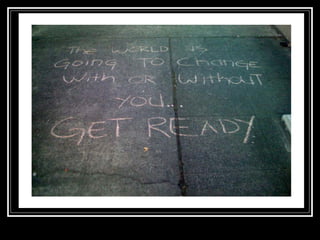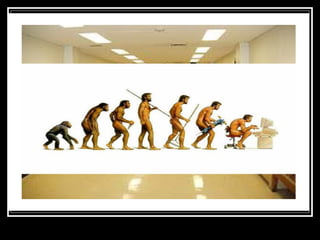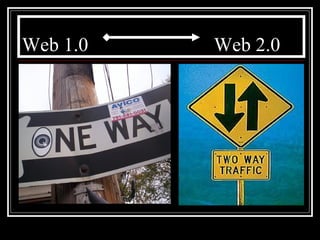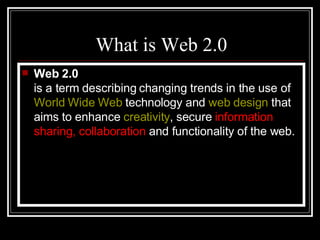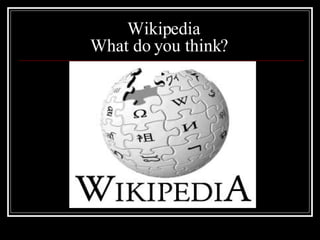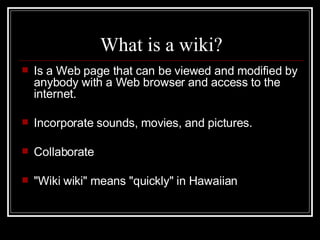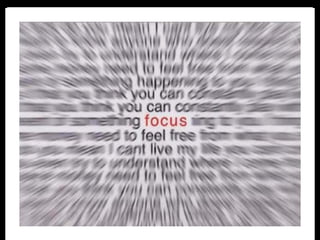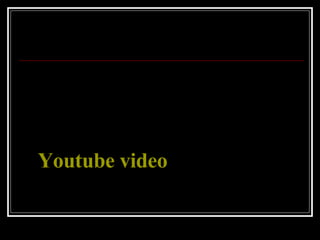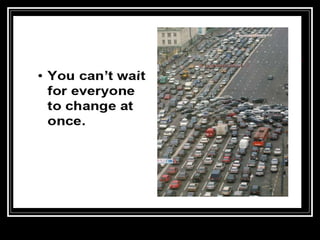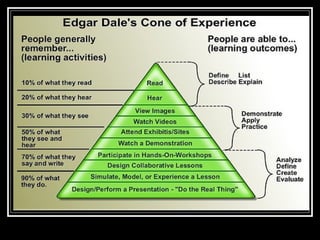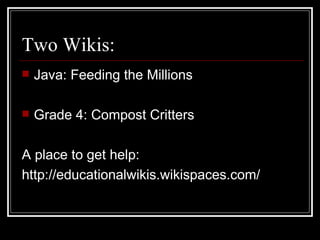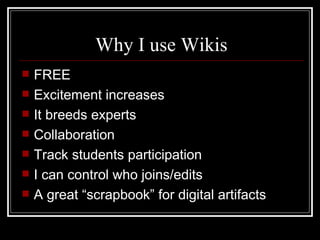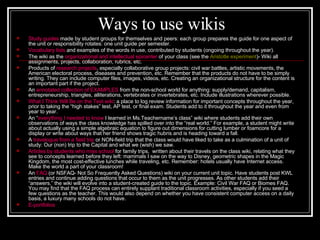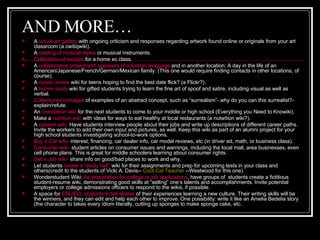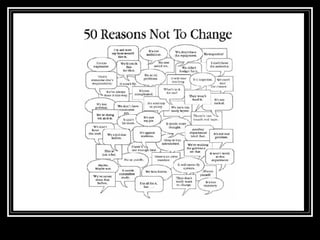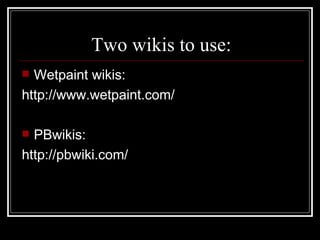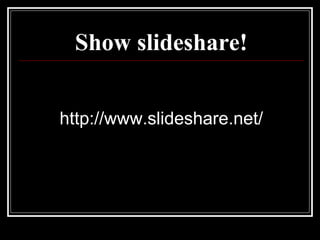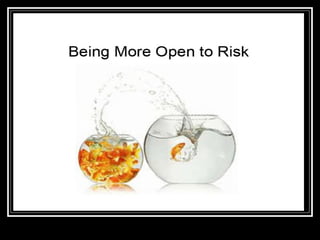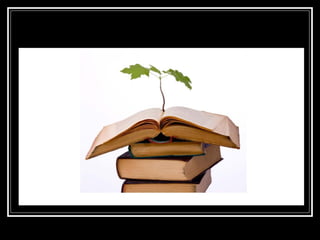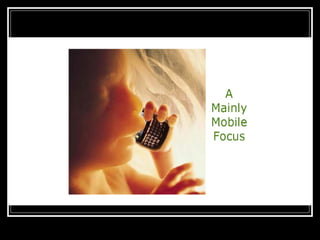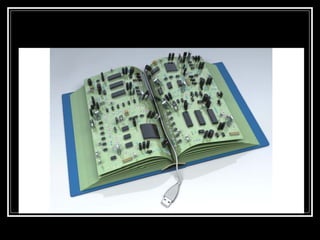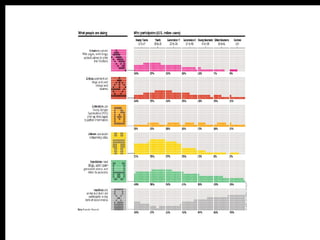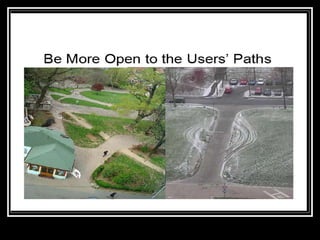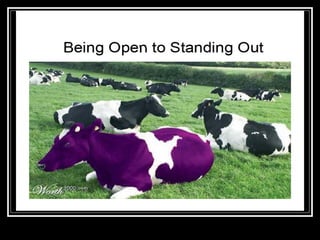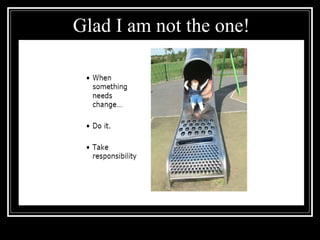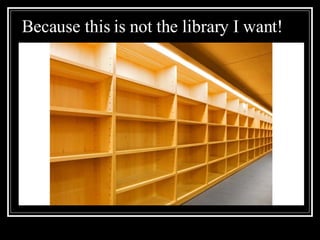The Wiki Way
- 1. THE WIKI WAY ¡° Wisdom of the crowd¡±
- 2. ?
- 3. ?
- 4. Web 1.0 Web 2.0
- 5. What is Web 2.0 Web 2.0 is a term describing changing trends in the use of World Wide Web technology and web design that aims to enhance creativity , secure information sharing, collaboration and functionality of the web.
- 6. Wikipedia What do you think?
- 7. What is a wiki? Is a Web page that can be viewed and modified by anybody with a Web browser and access to the internet. Incorporate sounds, movies, and pictures. Collaborate "Wiki wiki" means "quickly" in Hawaiian
- 8. ?
- 10. ?
- 11. ?
- 12. Two Wikis: Java: Feeding the Millions Grade 4: Compost Critters A place to get help: http://educationalwikis.wikispaces.com/
- 13. Why I use Wikis FREE Excitement increases It breeds experts Collaboration Track students participation I can control who joins/edits A great ¡°scrapbook¡± for digital artifacts
- 14. Ways to use wikis Study guides made by student groups for themselves and peers: each group prepares the guide for one aspect of the unit or responsibility rotates: one unit guide per semester. Vocabulary lists and examples of the words in use, contributed by students (ongoing throughout the year). The wiki as the organizational and intellectual epicenter of your class (see the Aristotle experiment )- Wiki all assignments, projects, collaboration, rubrics, etc. Products of research projects , especially collaborative group projects: civil war battles, artistic movements, the American electoral process, diseases and prevention, etc. Remember that the products do not have to be simply writing. They can include computer files, images, videos, etc. Creating an organizational structure for the content is an important part if the project. An annotated collection of EXAMPLES from the non-school world for anything: supply/demand, capitalism, entrepreneurship, triangles, alliterations, vertebrates or invertebrates, etc. Include illustrations wherever possible. What I Think Will Be on the Test wiki : a place to log review information for important concepts throughout the year, prior to taking the ¡°high stakes¡± test, AP test, or final exam. Students add to it throughout the year and even from year to year. An ¡° everything I needed to know I learned in Ms.Teachername¡¯s class¡± wiki where students add their own observations of ways the class knowledge has spilled over into the ¡°real world.¡± For example, a student might write about actually using a simple algebraic equation to figure out dimensions for cutting lumber or foamcore for a display or write about ways that her friend shows tragic hubris and is heading toward a fall. A travelogue from a field trip or NON-field trip that the class would have liked to take as a culmination of a unit of study: Our (non) trip to the Capital and what we (wish) we saw. Articles by students who miss school for family trips, ?written about their travels on the class wiki, relating what they see to concepts learned before they left: mammals I saw on the way to Disney, geometric shapes in the Magic Kingdom, the most cost-effective lunches while traveling, etc. Remember: hotels usually have Internet access. Make the world a part of your classroom! An FAQ (or NSFAQ- Not So Frequently Asked Questions) wiki on your current unit topic. Have students post KWL entries and continue adding questions that occur to them as the unit progresses. As other students add their ¡°answers,¡± the wiki will evolve into a student-created guide to the topic. Example: Civil War FAQ or Biomes FAQ. You may find that the FAQ process can entirely supplant traditional classroom activities, especially if you seed a few questions as the teacher. This would also depend on whether you have consistent computer access on a daily basis, a luxury many schools do not have. E-portfolios
- 15. AND MORE¡ A virtual art gallery with ongoing criticism and responses regarding artwork found online or originals from your art classroom (a cwitiqwiki). A catalog of musical styles or musical instruments. Collections of recipes for a home ec class. A collaborative project with speakers of a foreign language and in another location: A day in the life of an American/Japanese/French/German/Mexican family. (This one would require finding contacts in other locations, of course). A movie review wiki for teens hoping to find the best date flick? (a Flickr?). A humor study wiki for gifted students trying to learn the fine art of spoof and satire, including visual as well as verbal. Collections/montages of examples of an abstract concept, such as ¡°surrealism¡±- why do you can this surrealist?- explain/refute. An orientation wiki for the next students to come to your middle or high school (Everything you Need to Knowiki). Make a nutrition wiki with ideas for ways to eat healthy at local restaurants (a nutwition wiki?). A careers wiki. Have students interview people about their jobs and write up descriptions of different career paths. Invite the workers to add their own input and pictures, as well. Keep this wiki as part of an alumni project for your high school students investigating school-to-work options. Buy a Car wiki- interest, financing, car dealer info, car model reviews, etc (in driver ed, math, or business class). Consumer wiki- student articles on consumer issues and warnings, including the local mall, area businesses, even cell phone plans. This is great for middle schoolers learning about consumer rights. Get a Job wiki- share info on good/bad places to work and why. Let students create a ¡°study hall¡± wiki for their assignments and prep for upcoming tests in your class and others(credit to the students of Vicki A. Davis-- Cool Cat Teacher --Westwood for this one). Wonderstudent Wiki: As preparation for college or job applications , have groups of? students create a fictitious student-resume wiki, demonstrating good skills at ¡°selling¡± one¡¯s talents and accomplishments. Invite potential employers or college admissions officers to respond to the wikis, if possible. A space for ESL/ELL students to tell stories of their experiences learning a new culture. Their writing skills will be the winners, and they can edit and help each other to improve. One possibility: write it like an Amelia Bedelia story (the character to takes every idiom literally, cutting up sponges to make sponge cake, etc.
- 16. ?
- 17. Two wikis to use: Wetpaint wikis: http://www.wetpaint.com/ PBwikis: http://pbwiki.com/
- 19. ?
- 20. ?
- 21. ?
- 22. ?
- 23. ?
- 24. ?
- 25. ?
- 26. Glad I am not the one!
- 27. Because this is not the library I want!
